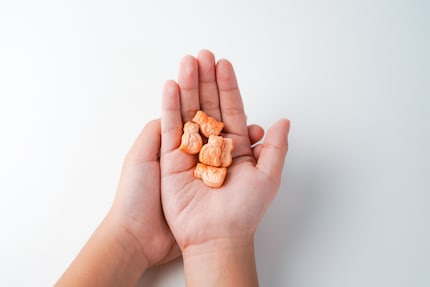
Background information
The fairy tale of healthy fruit and vegetables works
by Michael Restin

They are available as drops, jellies or liquids: Freely available food supplements for children. Stiftung Warentest" did not find the solution to vitamin deficiency in these colourfully marketed products, but above all superfluous and questionable products.
We all love our own children. And simple solutions too. That's why some parents like the idea of using nutritional supplements for their children. Instead of drooping corners of the mouth in front of a plate of spinach, a colourful drop in the shape of a bear quickly provides the necessary vitamins and minerals.
So much for the theory, which has little to do with practice. This is because many products are overdosed and inadequately labelled. Stiftung Warentest strongly advises against five products because they contain (too) large amounts of copper or vitamin A, among other things. Both can lead to health problems in children. Out of a total of 18 products tested, only one manufacturer adhered to the recommended quantities, advertising rules and warnings. Abtei's "Children's Vitamin D3" performed best - it was "only" rated as superfluous.
The test criteria explain why there was no better verdict. According to Stiftung Warentest, it is only recommended to administer vitamin D up to the second birthday, provided the child is sufficiently outdoors (in Switzerland only if there is too little sun exposure, even in the second and third year of life). The product, on the other hand, is only recommended from 4 years of age
?
The reference values are not the same everywhere - in Switzerland, for example, different values were used for a long time depending on the language region. They have now been standardised and are available on the website of the Federal Food Safety and Veterinary Office. The nutrition societies from Germany, Austria and Switzerland also issue joint recommendations, for example for vitamin A intake. In Switzerland, as in Germany, food supplements are considered food.

?
As all products are classified as "superfluous", it is obvious: the unproven benefits from a scientific point of view are criticised across the board, as healthy children in Germany are generally well supplied with vitamins and minerals through their diet. Corresponding data for Switzerland should be published this year.
15 out of 18 products were found to have significant or very significant deficiencies, with the stated daily dose exceeding the scientific recommendations. Five products were singled out for particular criticism. Firstly, Orthomol Junior C Plus, as it contains copper. Secondly, those that contain too much vitamin A beyond the recommended dosage for adults (Doppelherz System Omega-3 Family, Hübner Multivital Kids, Centrum Kids Multi Vitamin Gummies, Easyvit Easy Fishoil Multi).
A fundamental problem is that these products are aimed at children - or their parents - but so far there are only legally defined maximum levels for vitamins and minerals for adults.
The EU is working on this.
The EU is working to regulate food supplements more strictly. In Switzerland, the Consumer Protection Foundation is calling for a corresponding maximum quantity model for children. For good reason, because in its 2024 study conducted together with the Bern University of Applied Sciences market research into food supplements for children came to the following conclusion: "They are superfluous, expensive and often overdosed." Just like the "Stiftung Warentest"
This does not rule out the possibility that taking them on medical advice may make sense in individual cases. But it does show that although parents spend good money on colourful "thinking bears" or similar products, they are generally not doing their children any good.
Simple writer and dad of two who likes to be on the move, wading through everyday family life. Juggling several balls, I'll occasionally drop one. It could be a ball, or a remark. Or both.
From the latest iPhone to the return of 80s fashion. The editorial team will help you make sense of it all.
Show all